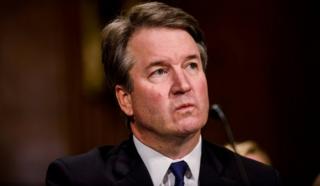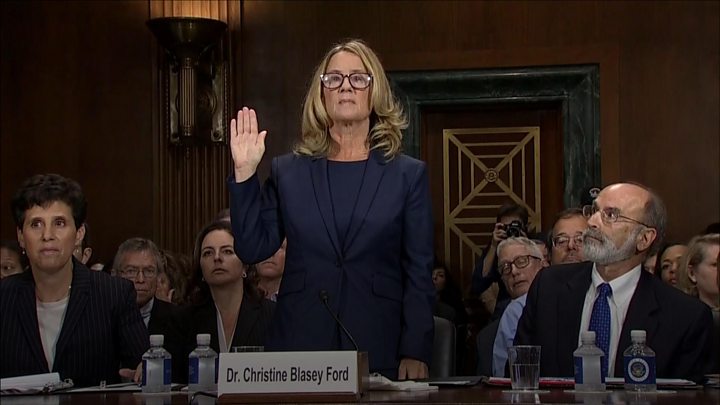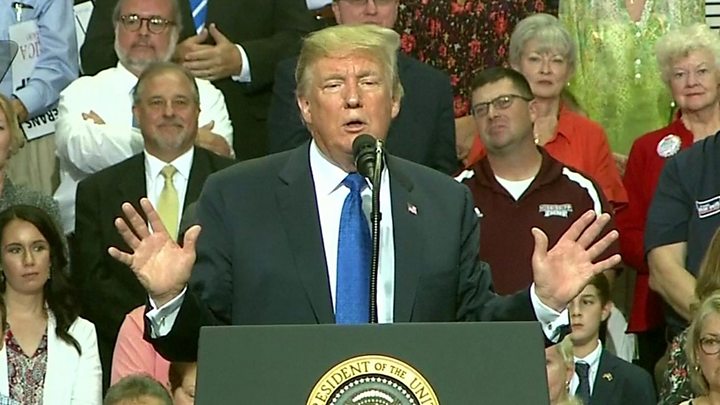 Image copyright
Reuters
Image copyright
Reuters
The US Senate is expected to receive an FBI report on allegations of sexual misconduct against President Trump's Supreme Court nominee, Brett Kavanaugh, in the next few hours.
Its conclusions will not be made public, but Senators will be able to review the report on Thursday.
Republicans and Democrats remain bitterly divided on whether to approve Mr Kavanaugh as a Supreme Court judge.
The judge has vehemently denied all allegations against him.
What are the allegations?
Last week Professor Christine Blasey Ford testified to the Senate Judiciary Committee that Mr Kavanaugh and another man had assaulted her when they were teenagers in the 1980s.
Another woman, Deborah Ramirez, has accused Judge Kavanaugh of exposing himself to her during a drinking game when they were students at Yale University in the 1980s.
After Prof Ford's testimony the Senate panel approved Judge Kavanaugh's nomination but asked for the FBI to conduct further inquiry before the full Senate votes on his appointment to America's top court.

However the FBI is not looking at allegations made by a third woman, Julie Swetnick, that Mr Kavanaugh was involved in the drugging and sexual assault of girls at house parties in the 1980s. He has described Ms Swetnick's allegation as a "joke".
What's at stake?
Republican Senate Majority Leader Mitch McConnell wants a final Senate vote on Judge Kavanaugh's nomination on Saturday.
If he joins the Supreme Court, Judge Kavanaugh, 53, would be expected to tilt its ideological balance in favour of conservatives.
The court's nine justices are appointed for life and have the final say on some of the most contentious issues in US public life, from abortion, to gun control, to voting laws.
What's in the report?
Senators are not meant to reveal what the FBI report says, but it remains to be seen whether that secrecy will hold.
The report will be in paper format only and no copies will be made. It will be held in a secure room in the basement of the Capitol building, known as a Sensitive Compartmented Information Facility, or Skif, AP reported.
Committee chairman Chuck Grassley will see it at 08:00 local time (12:00 GMT) and ranking Democrat Diane Feinstein will see it at 09:00, NBC reported. After that, the Republican committee members will see it at 10:00 and the Democrats at 11:00.

Reuters reported that investigators spoke to Ms Ramirez for more than two hours on Sunday, and that she provided a list of more than 20 possible witnesses.
Democrats have raised concerns that the investigation has been too narrow in scope, and that key witnesses have been omitted.
Will Kavanaugh be confirmed?
Mr Kavanaugh's confirmation depends on Republican Senators voting strictly along party lines.
The party has only a 51-49 Senate majority. That means that if all Democrats vote against confirming Mr Kavanaugh, Republicans can only afford one defection - since in a tie, Vice-President Mike Pence would get the casting vote.
Three Republican Senators - Jeff Flake, Susan Collins and Lisa Murkowski - are being closely watched, as they have not yet said how they will vote.
Two Democrats, Joe Manchin of West Virginia, and Heidi Heitkamp of North Dakota, are yet to declare their intentions.
President Donald Trump has consistently backed Mr Kavanaugh, tweeting late on Wednesday that he was a "fine man".
In contrast to the president's enthusiasm, a coalition of US Christian churches with 40 million worshippers has urged Mr Kavanaugh to withdraw his nomination.
The National Council of Churches said in a statement that he had shown "extreme partisan bias" during his testimony to the Senate Judiciary Committee, and lacked the temperament to be a Supreme Court judge.